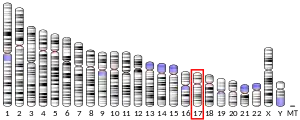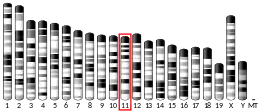APRIL (protein)
A proliferation-inducing ligand (APRIL), also known as tumor necrosis factor ligand superfamily member 13 (TNFSF13), is a protein of the TNF superfamily recognized by the cell surface receptor TACI.[5][6] It is encoded by the TNFSF13 gene.[6]
| TNFSF13 | |||||||||||||||||||||||||||||||||||||||||||||||||||
|---|---|---|---|---|---|---|---|---|---|---|---|---|---|---|---|---|---|---|---|---|---|---|---|---|---|---|---|---|---|---|---|---|---|---|---|---|---|---|---|---|---|---|---|---|---|---|---|---|---|---|---|
| |||||||||||||||||||||||||||||||||||||||||||||||||||
| Identifiers | |||||||||||||||||||||||||||||||||||||||||||||||||||
| Aliases | TNFSF13, APRIL, CD256, TALL-2, TALL2, TRDL-1, ZTNF2, UNQ383/PRO715, TNLG7B, tumor necrosis factor superfamily member 13, TNF superfamily member 13 | ||||||||||||||||||||||||||||||||||||||||||||||||||
| External IDs | OMIM: 604472 MGI: 1916833 HomoloGene: 56971 GeneCards: TNFSF13 | ||||||||||||||||||||||||||||||||||||||||||||||||||
| |||||||||||||||||||||||||||||||||||||||||||||||||||
| |||||||||||||||||||||||||||||||||||||||||||||||||||
| |||||||||||||||||||||||||||||||||||||||||||||||||||
| |||||||||||||||||||||||||||||||||||||||||||||||||||
| |||||||||||||||||||||||||||||||||||||||||||||||||||
| Wikidata | |||||||||||||||||||||||||||||||||||||||||||||||||||
| |||||||||||||||||||||||||||||||||||||||||||||||||||
Nomenclature
In the cluster of differentiation terminology, APRIL is designated CD256.
Function
The protein encoded by this gene is a member of the tumor necrosis factor ligand (TNF) ligand family. This protein is a ligand for TNFRSF17/BCMA, a member of the TNF receptor family. This protein and its receptor are both found to be important for B cell development. In vivo experiments suggest an important role for APRIL in the long-term survival of plasma cells in the bone marrow. Mice deficient in APRIL have normal immune system development.[7] However, APRIL-deficient mice have also been reported to possess a reduced ability to support plasma cell survival.[8] In vitro experiments suggested that this protein may be able to induce apoptosis through its interaction with other TNF receptor family proteins such as TNFRSF6/FAS and TNFRSF14/HVEM.[9] Three alternatively spliced transcript variants of this gene encoding distinct isoforms have been reported.
Interactions
TNFSF13 has been shown to interact with TNFRSF13B[10] and B-cell activating factor.[11]
Clinical significance
APRIL is being explored as a target for autoimmune diseases and B cell malignancies.[12] At least one anti-APRIL monoclonal antibody has been announced to enter phase I clinical trials for multiple myeloma.[13]
References
- GRCh38: Ensembl release 89: ENSG00000161955 - Ensembl, May 2017
- GRCm38: Ensembl release 89: ENSMUSG00000089669 - Ensembl, May 2017
- "Human PubMed Reference:". National Center for Biotechnology Information, U.S. National Library of Medicine.
- "Mouse PubMed Reference:". National Center for Biotechnology Information, U.S. National Library of Medicine.
- Hahne M, Kataoka T, Schröter M, Hofmann K, Irmler M, Bodmer JL, Schneider P, Bornand T, Holler N, French LE, Sordat B, Rimoldi D, Tschopp J (September 1998). "APRIL, a new ligand of the tumor necrosis factor family, stimulates tumor cell growth". The Journal of Experimental Medicine. 188 (6): 1185–90. doi:10.1084/jem.188.6.1185. PMC 2212534. PMID 9743536.
- "Entrez Gene: TNFSF13 tumor necrosis factor (ligand) superfamily, member 13". National Library of Medicine. 10 October 2023. Retrieved 13 October 2023.
- Varfolomeev E, Kischkel F, Martin F, Seshasayee D, Wang H, Lawrence D, Olsson C, Tom L, Erickson S, French D, Schow P, Grewal IS, Ashkenazi A (February 2004). "APRIL-deficient mice have normal immune system development". Molecular and Cellular Biology. 24 (3): 997–1006. doi:10.1128/MCB.24.3.997-1006.2004. PMC 321448. PMID 14729948.
- Belnoue E, Pihlgren M, McGaha TL, Tougne C, Rochat AF, Bossen C, Schneider P, Huard B, Lambert PH, Siegrist CA (March 2008). "APRIL is critical for plasmablast survival in the bone marrow and poorly expressed by early-life bone marrow stromal cells". Blood. 111 (5): 2755–64. doi:10.1182/blood-2007-09-110858. PMID 18180376.
- Roth W, Wagenknecht B, Klumpp A, Naumann U, Hahne M, Tschopp J, Weller M (April 2001). "APRIL, a new member of the tumor necrosis factor family, modulates death ligand-induced apoptosis". Cell Death and Differentiation. 8 (4): 403–10. doi:10.1038/sj.cdd.4400827. PMID 11550092.
- Wu Y, Bressette D, Carrell JA, Kaufman T, Feng P, Taylor K, Gan Y, Cho YH, Garcia AD, Gollatz E, Dimke D, LaFleur D, Migone TS, Nardelli B, Wei P, Ruben SM, Ullrich SJ, Olsen HS, Kanakaraj P, Moore PA, Baker KP (November 2000). "Tumor necrosis factor (TNF) receptor superfamily member TACI is a high affinity receptor for TNF family members APRIL and BLyS". The Journal of Biological Chemistry. 275 (45): 35478–85. doi:10.1074/jbc.M005224200. PMID 10956646.
- Roschke V, Sosnovtseva S, Ward CD, Hong JS, Smith R, Albert V, Stohl W, Baker KP, Ullrich S, Nardelli B, Hilbert DM, Migone TS (October 2002). "BLyS and APRIL form biologically active heterotrimers that are expressed in patients with systemic immune-based rheumatic diseases". Journal of Immunology. 169 (8): 4314–21. doi:10.4049/jimmunol.169.8.4314. PMID 12370363.
- Ryan MC, Grewal IS (2009-01-01). Grewal IS (ed.). Therapeutic Targets of the TNF Superfamily. Advances in Experimental Medicine and Biology. Vol. 647. New York: Springer. pp. 52–63. doi:10.1007/978-0-387-89520-8_4. ISBN 978-0-387-89519-2. PMID 19760066.
- "Development of a first in class APRIL fully blocking antibody BION-1301 for the treatment of multiple myeloma". AACR 2017 Proceedings. April 2017.
Further reading
- Bossen C, Schneider P (October 2006). "BAFF, APRIL and their receptors: structure, function and signaling" (PDF). Seminars in Immunology. 18 (5): 263–75. doi:10.1016/j.smim.2006.04.006. PMID 16914324.
- Tangye SG, Bryant VL, Cuss AK, Good KL (October 2006). "BAFF, APRIL and human B cell disorders". Seminars in Immunology. 18 (5): 305–17. doi:10.1016/j.smim.2006.04.004. PMID 16916610.
- Treml LS, Crowley JE, Cancro MP (October 2006). "BLyS receptor signatures resolve homeostatically independent compartments among naïve and antigen-experienced B cells". Seminars in Immunology. 18 (5): 297–304. doi:10.1016/j.smim.2006.07.001. PMID 16919470.
- Mackay F, Leung H (October 2006). "The role of the BAFF/APRIL system on T cell function". Seminars in Immunology. 18 (5): 284–9. doi:10.1016/j.smim.2006.04.005. PMID 16931039.
- Maruyama K, Sugano S (January 1994). "Oligo-capping: a simple method to replace the cap structure of eukaryotic mRNAs with oligoribonucleotides". Gene. 138 (1–2): 171–4. doi:10.1016/0378-1119(94)90802-8. PMID 8125298.
- Suzuki Y, Yoshitomo-Nakagawa K, Maruyama K, Suyama A, Sugano S (October 1997). "Construction and characterization of a full length-enriched and a 5'-end-enriched cDNA library". Gene. 200 (1–2): 149–56. doi:10.1016/S0378-1119(97)00411-3. PMID 9373149.
- Shu HB, Hu WH, Johnson H (May 1999). "TALL-1 is a novel member of the TNF family that is down-regulated by mitogens". Journal of Leukocyte Biology. 65 (5): 680–3. doi:10.1002/jlb.65.5.680. PMID 10331498. S2CID 1498303.
- Cousin P, Billotte J, Chaubert P, Shaw P (January 2000). "Physical map of 17p13 and the genes adjacent to p53". Genomics. 63 (1): 60–8. doi:10.1006/geno.1999.6062. PMID 10662545.
- Kelly K, Manos E, Jensen G, Nadauld L, Jones DA (February 2000). "APRIL/TRDL-1, a tumor necrosis factor-like ligand, stimulates cell death". Cancer Research. 60 (4): 1021–7. PMID 10706119.
- Wu Y, Bressette D, Carrell JA, Kaufman T, Feng P, Taylor K, Gan Y, Cho YH, Garcia AD, Gollatz E, Dimke D, LaFleur D, Migone TS, Nardelli B, Wei P, Ruben SM, Ullrich SJ, Olsen HS, Kanakaraj P, Moore PA, Baker KP (November 2000). "Tumor necrosis factor (TNF) receptor superfamily member TACI is a high affinity receptor for TNF family members APRIL and BLyS". The Journal of Biological Chemistry. 275 (45): 35478–85. doi:10.1074/jbc.M005224200. PMID 10956646.
- Yu G, Boone T, Delaney J, Hawkins N, Kelley M, Ramakrishnan M, McCabe S, Qiu WR, Kornuc M, Xia XZ, Guo J, Stolina M, Boyle WJ, Sarosi I, Hsu H, Senaldi G, Theill LE (September 2000). "APRIL and TALL-I and receptors BCMA and TACI: system for regulating humoral immunity". Nature Immunology. 1 (3): 252–6. doi:10.1038/79802. PMID 10973284. S2CID 6799584.
- López-Fraga M, Fernández R, Albar JP, Hahne M (October 2001). "Biologically active APRIL is secreted following intracellular processing in the Golgi apparatus by furin convertase". EMBO Reports. 2 (10): 945–51. doi:10.1093/embo-reports/kve198. PMC 1084076. PMID 11571266.
- Stein JV, López-Fraga M, Elustondo FA, Carvalho-Pinto CE, Rodríguez D, Gómez-Caro R, De Jong J, Martínez-A C, Medema JP, Hahne M (June 2002). "APRIL modulates B and T cell immunity". The Journal of Clinical Investigation. 109 (12): 1587–98. doi:10.1172/JCI15034. PMC 151011. PMID 12070306.
- Litinskiy MB, Nardelli B, Hilbert DM, He B, Schaffer A, Casali P, Cerutti A (September 2002). "DCs induce CD40-independent immunoglobulin class switching through BLyS and APRIL". Nature Immunology. 3 (9): 822–9. doi:10.1038/ni829. PMC 4621779. PMID 12154359.
- Roschke V, Sosnovtseva S, Ward CD, Hong JS, Smith R, Albert V, Stohl W, Baker KP, Ullrich S, Nardelli B, Hilbert DM, Migone TS (October 2002). "BLyS and APRIL form biologically active heterotrimers that are expressed in patients with systemic immune-based rheumatic diseases". Journal of Immunology. 169 (8): 4314–21. doi:10.4049/jimmunol.169.8.4314. PMID 12370363.
- Pradet-Balade B, Medema JP, López-Fraga M, Lozano JC, Kolfschoten GM, Picard A, Martínez-A C, Garcia-Sanz JA, Hahne M (November 2002). "An endogenous hybrid mRNA encodes TWE-PRIL, a functional cell surface TWEAK-APRIL fusion protein". The EMBO Journal. 21 (21): 5711–20. doi:10.1093/emboj/cdf565. PMC 131062. PMID 12411489.
External links
- TNFSF13+protein,+human at the U.S. National Library of Medicine Medical Subject Headings (MeSH)
- Human TNFSF13 genome location and TNFSF13 gene details page in the UCSC Genome Browser.
This article incorporates text from the United States National Library of Medicine, which is in the public domain.



